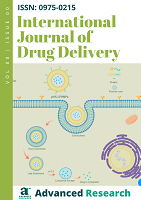In vitro release behavior of paclitaxel and carboplatin from poly(l-lactide) microspheres dispersed in thermosensitive biodegradable gel for combination therapy
Keywords:
Thermosensitive hydrogels, Microspheres, controlled release, combination chemotherapyAbstract
The objective of the current work was to design an injectable, sustained release formulation of a combination of anticancer drugs, carboplatin and paclitaxel, for localized delivery. In this combination formulation, carboplatin was encapsulated into poly(L-lactide) (PLA) microspheres and paclitaxel was dissolved in thermosensitive biodegradable gel of PLGA-PEG-PLGA (poly (DL-lactide-co-glycolide- polyethylene glycol- poly (DL-lactide-co-glycolide)); no external solvent like cremophorEL was used in the formulation, further, these carboplatin microspheres were dispersed in the gel containing paclitaxel to achieve a single delivery system. The combined formulation was assessed for various parameters for sustained release of both the drugs. Release profiles of carboplatin from PLA microspheres; paclitaxel from hydrogel alone and in combination with carboplatin and carboplatin microspheres dispersed in paclitaxel loaded gel were studied. In vitro release of both the drugs from PLGA-PEG-PLGA hydrogel showed that carboplatin was released with 40-50% burst release and paclitaxel was released in biphasic manner for 50-60 days. Initial burst of carboplatin was controlled by incorporating it in PLA microspheres which were then dispersed in paclitaxel loaded hydrogel and the new formulation did not exhibit any burst release of the drug. Release pattern of combination formulations revealed that the two drugs were co-eluting from a single delivery system and the rate of release of each of the individual drugs was significantly affected. Thus, a novel injectable combination formulation for sustained and simultaneous delivery of carboplatin and paclitaxel was developed which provided sustained release of each of the drugs and could be further explored in tumor models.
References
Skipper HE, Schabel FM, Mellet LB,
Montogomery JA, Wilkoff LJ, Lloyd HH,
Brockman RW. Implications of
biochemical, cytokinetic, pharmacologic,
and toxicologic relationships in the design
of optimal therapeutic schedules. Cancer
Chemother Rep 1970;54:431-450.
Chabner BA, Amrein PC, Druker BJ,
Michaelson MD, Goss PE, Ryan DP.
Antineoplastic Agents. In: Brunton AC,
Lazo JS,Parker KL, editors. Goodman and
Gilman's The Pharmacological Basis of
Therapeutics. 11 ed. New York: McGrawHill; 2006;p.1375-1465.
Dhanikula AB, Panchagnula R. Localized
paclitaxel delivery. Int J Pharm
;183:85-100.
Laohavinij S, Maoleekoonpairoj S,
Cheirsilpa A, Maneechavakajorn J,
Sirachainant E, Arpornvivat W,
Jaisathaporn K, Ratanatharathorn V.
Phase II study of paclitaxel and
carboplatin for advanced non-small-cell
lung cancer. Lung Cancer 1999;26:175-
Stordal B, Pavlakis N, Davey R. A
systematic review of platinum and taxane
resistance from bench to clinic: An
inverse relationship. Cancer Treat Rev
;33:688-703.
Perez EA. Carboplatin in Combination
Therapy for Metastatic Breast Cancer.
The Oncologist 2004;9:518-527.
Coleman KO, Steven WJ, Andre R,
Debbie K, James MB, Thomas CH,
Robert FO, Peter JO, James MG.
Evaluation of carboplatin
pharmacokinetics in the absence and
presence of paclitaxel. Clin Cancer Res
;2:549-552.
Tomoko O, Yasutsuna S, Tomohide T,
Yoshinori M, Hiroshi N, Yutaka N,
Nagahiro S. Clinical pharmacokinetics
and pharmacodynamics of paclitaxel: A 3-
hour infusion versus a 24-hour infusion.
Clin Cancer Res 1995;1:599-606.
Liggins RT, Hunter WL, Burt HM. Solidstate characterization of paclitaxel. J
Pharm Sci 1997;86:1458-1463.
Perdue JD, Seaton PJ, Tyrell JA, DeVido
DR. The removal of cremophorEL from
paclitaxel for quantitative analysis by
HPLC-UV. J Pharm Biomed Anal
;41:117-123.
Chen S, Pieper R, Webster DC, Singh J.
Triblock copolymers: synthesis,
characterization, and delivery of a model
protein. Int J Pharm 2005;288:207-218.
Qiao M, Chen D, Ma X, Liu Y. Injectable
biodegradable temperature-responsive
PLGA-PEG-PLGA copolymers: synthesis
and effect of copolymer composition on
the drug release from the copolymerbased hydrogels. Int J Pharm
;294:103-112.
Rathi RC, Zenter GM. Biodegradable low
molecular weight triblock poly(lactide-coglycolide) polyethylene glycol
copolymers having reverse thermal
gelation properties. US Patent 6201072,
Dec 21, 1999.
Choi S, Kim SW. Controlled release of
insulin from injectable biodegradable
triblock copolymer depot in ZDF rats.
Pharm Res 2003;20:2008-2010.
Zentner GM, Rathi R, Shih C, McRea JC,
Seo MH, Oh H, Rhee BG, Mestecky J,
Moldoveanu Z, Morgan M, Weitman S.
Biodegradable block copolymers for
delivery of proteins and water-insoluble
drugs. J Control Release 2001;72:203-
Berchane NS, Carson KH, Rice-Ficht AC,
Andrews MJ. Effect of mean diameter and
polydispersity of PLG microspheres on
drug release: Experiment and theory. Int J
Pharm 2007;337:118-126.
Shinoda H, Ohtaguro M. Preparation
process for bioabsorbable polyester. US
Patent 5041529, Aug 20, 1991.
Mittal A, Chitkara D, Kumar N. HPLC
method for the determination of
carboplatin and paclitaxel with
cremophorEL in an amphiphilic polymer
matrix. J Chromatography B
;855:211-219.
Chen S, Pieper R, Webster DC, Singh J.
Triblock copolymers: synthesis,
characterization, and delivery of a model
protein. Int. J. Pharm. 2005;288:207-218.





